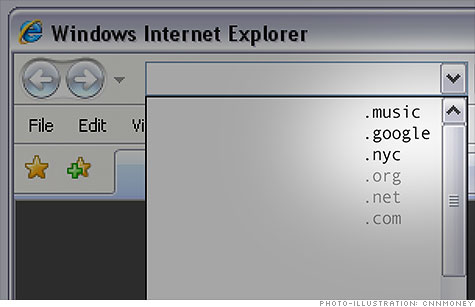Search News

NEW YORK (CNNMoney) -- Next week, the public will get its first look at the proposed list of new Web domains in the largest-ever expansion of the Internet's naming system. We're headed way beyond .com and .org -- get ready for .google, .sex and thousands more.
But you won't be clicking your way to those new sites any time soon. Expanding the Internet's domains is a slow, wildly complicated process -- and those in the trenches aren't thrilled with how it's gone so far.
"I always tell people to take any timetable with a pinch of salt," said Stuart Lawley, CEO of ICM Registry, speaking of his experience in launching the adult-themed .xxx domain in December. "We lived through huge delays with .xxx, so we expect to see the timeline slipping with this new process, too."
The Internet Corporation for Assigned Names and Numbers (ICANN), the nonprofit organization that manages this piece of the Internet's infrastructure, has been preparing for this almost-anything-goes domain name expansion for nearly a decade.
Last June, it formally approved the expansion and started planning the application process for new generic top-level domains (gTLDs) -- the ".com" part of website addresses.
The current system has 22 gTLDs -- not including geographic domains -- like .com, .net and .org. ICANN has added a handful over the past decade, sprinkling in additions like .biz, .info and .xxx. This new expansion is by far the organization's biggest move.
But the process quickly devolved into a bug-plagued mess.
ICANN began accepting proposals for new domains on January 12 and planned to reveal the list of applicants on April 30. But on April 12 -- which was meant to be the last day to submit an application -- ICANN took the system offline after a "glitch" allowed some users to see other applicants' data.
Brian Cute, the CEO of the Public Interest Registry (PIR), saw the bug firsthand.
"We were going through the process, and all of a sudden someone else's [file name] popped up," he told CNNMoney.
ICANN planned to have the system back within a few days. Instead, the problems persisted for weeks, with ICANN posting "we're working on it" updates almost daily from April 13 to May 9. ICANN finally re-opened the application system on May 21 and extended its deadline until May 30.
"For a company that is so closely connected with running the Internet to have a glitch in an online system is ironic. It's unacceptable," said Adrian Kinderis, CEO of ARI Registry Services, which provides back-end technology for domain-name operators.
"It wasn't necessarily the delay everyone was upset about," he added. "It was more the process and the way that ICANN was handling it. They weren't telling us the impact of what this means."
CNNMoney reached out to ICANN multiple times about the botched application process, but the group's representatives repeatedly said no one was available to comment.
What comes next: Despite the delays, ICANN received more than 1,900 proposals for new domain names. It plans to reveal the list of applicants and their proposed domains in a press conference on June 13.
Those in the running have huge sums at stake. Simply submitting an application cost $185,000 per domain -- meaning ICANN took in more than $350 million from applications alone. (That's a giant windfall for an organization with an annual budget of just $67 million for 2012, but ICANN says the steep fees are needed to cover the extensive technical and legal reviews it will conduct on each proposal.)
After the applications are revealed on June 13, the real fun begins.
With domains like .web and .sport, many suitors are expected to battle for the same coveted keyword. If multiple applicants want a single domain and ICANN deems them equally worthy, it's decision time.
The applicants can try to negotiate between themselves and come to an agreement -- one that will probably involve cash. Otherwise, the name goes to auction. Those tracking the process predict that it could easily cost millions to lock up a coveted domain.
Here's another wrinkle: Even if two keywords aren't exactly the same, "confusingly similar" domain suffixes are forbidden. For example, if an apple farmers' union grabs .apples, then iGizmo maker Apple (APPL) would be blocked permanently from registering .apple.
Sorting out all those logistics is going to take months, at a minimum. ICANN currently expects the first new domains to actually go live in "early" 2013; applicants say April or May seems like the soonest possible target.
More slippage is possible -- and probably likely.
"As a battle-hardened TLD applicant, I tell people: expect it to take three times as much money and three times as long as you think," said ICM Registry's Lawley.
"Every month that .xxx was delayed, it was costing us about another $150,000 in salary and rent," he said. "It got into the millions. You can imagine [new gTLD applicants] pulling their hair out over these delays. It's a lot of money without any revenue."
Some in the queue say they're willing to be patient. After all, they've already been waiting what seems like eons for things to make it this far.
Take Donuts, a year-old startup that scored $100 million from investors to fund its 307 gTLD applications.
"There's so much pent-up demand," said co-founder Daniel Schindler, who thinks the existing name spaces -- especially .com -- are totally saturated.
"The idea has been marinating for 10 years," he said. "And as an individual, I've been working on this for five years. We're ready." ![]()